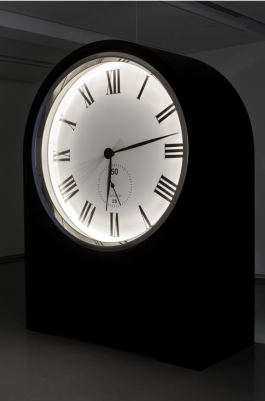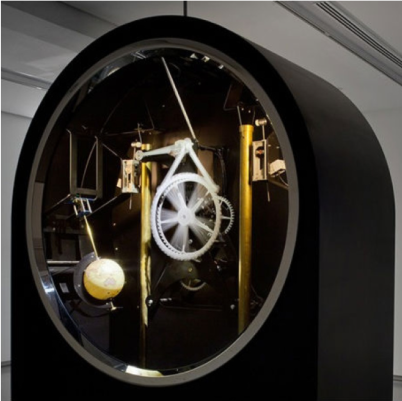Image: Untitled (Clock), Stuart Ringholt, 2014
My colleagues Lilia Mantai, Vanessa Fredericks and I have a new paper published: Deferred time in the neoliberal university: experiences of doctoral candidates and early career academics. It appears in a special issue of Teaching in Higher Education on the timescapes of teaching, with several articles that I have added to my to-read list! (Free copies of our paper are currently available here; once these expire, if you do not have access via an institutional library, you can request a pre-print via Researchgate).
It was written before the outbreak of COVID-19 (although we snuck in a mention during the final review stage), but our argument about the experience of time, uncertainty and anxiety is prescient. (This paper has been a long time coming: Lilia and I took a reading retreat towards the end of 2016; I presented an early version at the Academic Identities Conference in 2018; and Lilia, Vanessa and I spent a day writing together and eating vegan food in October last year. Take heart if you are writing something slowly!)
The article brings together two studies: interviews with 64 PhD candidates from two Australian universities on their doctoral experience and researcher identity development; and a survey of 522 self-defining ECAs from three Australian universities on factors impacting work experience and career trajectories. We analyse these data using Ylijoki and Mäntylä’s (2003) ‘Conflicting Time Perspectives in Academic Work’:
Scheduled time refers to the accelerating pace of work, timeless time to transcending time through immersion in work, contracted time to short-term employment with limited future prospects and finally, personal time to one’s temporality and the role of work in it.
Theorising with Derrida’s Specters of Marx (1994), we emphasise the experiences of doctoral candidates and early career academics as political subjects in the neoliberal university, and add a category of deferred time.
In Enduring Time, Lisa Baraitser (2017) describes deferred or suspended time as marked by “modes of waiting, staying, delaying, enduring, persisting, repeating, maintaining, preserving and remaining – that produce the experience of time not passing.”
Here is how our research participants describe it:
In the immediate future, I am trying to secure a permanent position and/or postdoctoral position. In the longer term, I am hoping to remain in academia … I am not ruling out a career outside academia. The longer it takes for me to secure an academic position, the more I will explore other options (though this is difficult).
Quite frankly it is impossible to make [career] plans … I have become some kind of Universal Academic that can be called in at short notice to teach: Mathematics, Statistics, Finance, Business, Marketing, Engineering, Media Studies, and lately even Music Theory. This situation is clearly absurd, and I know I am not alone.
My greatest desire at this point is to secure permanent employment and no longer be on ‘6 month’ or 1 year’ contracts (as I have been for the last two and half years). The instability of my current situation is quite stressful (I have no idea if I’ll still have a job in 6 months) and doesn’t allow me, or my family, to make any plans into the future.
I would like to get an ongoing teaching and research position in a university … I recognise that I am likely to work in a number of casual and short-term contract positions before that becomes a reality (if ever). As I have a family to support, I am aware that I might have to face the possibility of abandoning my plans and take work in another area or even a different sector.
Following Derrida’s line of argument, as political subjects of the neoliberal university, whose temporality is externally driven, doctoral candidates and early career academics are in a deferred state of waiting for the ‘messianic promise’ of secure academic careers and balanced working conditions. The dominant affect of deferred time, which contaminates the experience of scheduled, contracted, timeless and personal time, is anxiety.
We ended our paper on a hopeful note: PhD candidate and early career participants are active agents in managing the temporalities of academic work, defending their personal time and planning potential futures within and beyond academe. (If this is you, as a starting point I recommend Inger Mewburn’s work on post-PhD futures and ImaginePhD).


Hi Agnes, nice read.
Could you not say the same though of any person now working in the precariates that proliferate in universities?
I spent some years on rolling three or six-month contracts as an IT person using various IT skills in different jobs in different universities and departments before finally grasping the holy-grail of fulltime-continuing. The statement “The instability of my current situation is quite stressful (I have no idea if I’ll still have a job in 6 months) and doesn’t allow me, or my family, to make any plans into the future.” could easily have applied to me.
Cheers,
Michael
LikeLike
You are absolutely right, Michael.
We only interviewed and surveyed early career academics and doctoral candidates, but the precarity problem in higher education is much broader than that. As well as professional, support and administrative staff, the COVID-19 context has also significantly impacted food outlets on campus, gym and childcare staff, and more. Everyone associated with the university is experiencing pervasive anxiety, which more severely impacts precarious employees.
Yesterday’s news about 500 jobs lost at UNSW is worrying, and likely to be especially detrimental to professional staff.
LikeLike
Pingback: Speculating on time | The Slow Academic